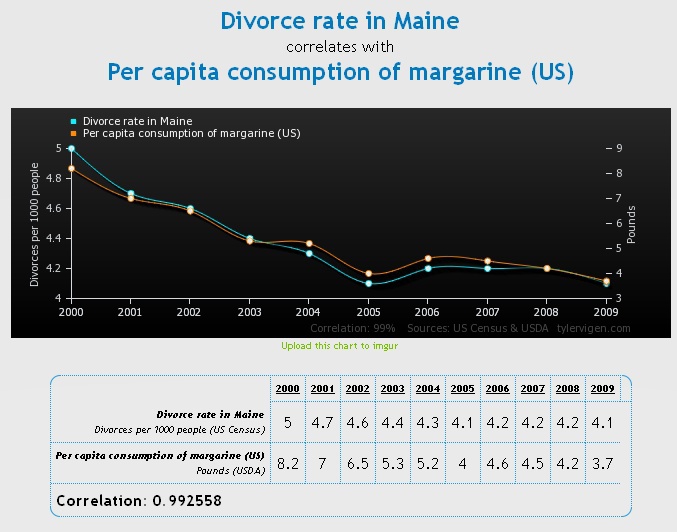Spurious Correlations: service for the "game" with any sets of statistics

In many scientific and not very scientific articles we can see quite a solid set of any statistical data. The sets of such data are often compared, to determine the possible connection. Well, for example, a scientist can associate periodic climate change and a change in the population of oysters in a particular region. On the basis of such data sets, far-reaching conclusions are made, and the dynamics of the oyster population for the coming decades is also predicted.
There are less obvious correlations when comparing changes in the magnetic field, for example, and the number of diseases of the influenza virus. Often such data correlate quite well, and the uninitiated person is very impressed.
')
However, many people know that it is possible to play with the “average temperature in the hospital” as you please, using the data obtained to prove any theory. And the service Spurious Correlations shows that this is true. For example, you can see that the graphs of the age “Miss America” of different years wonderfully correlate with the graph of the number of deaths due to steam and / or various kinds of hot objects.

Some kind of nonsense is obtained, right? And indeed, there is simply no visible or hidden connection in such a case.
However, we see a coincidence in the dynamics of consumption of margarine and the number of divorces, for example. There is also no connection and there can be no (probably).
In general, the Spurious Correlations service serves as a “game” with statistics, so that an ordinary person can see how some calculations and comparisons are made.
The service has a wide variety of data, and by selecting a data set, you can ask the service to search for a similar data set. Of course, both data sets are unlikely to be at least somehow related to each other. But the visual similarity is obvious.
By the way, the user of the service may mark the found “correlations” as “interesting” or “uninteresting”, and such connections will be shown to other users.
Of course, we can assume that the service will be used by unscrupulous "scientists", various kinds of "esoteric popularizers" and unfortunate inventors. But this is hardly something you can do.
Source: https://habr.com/ru/post/222473/
All Articles